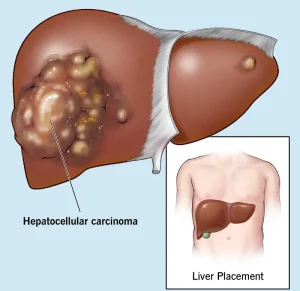Overview
Diagnosis
To diagnose hepatocellular carcinoma, a healthcare professional may perform a physical examination and review your medical history. Various imaging and blood tests can help confirm the diagnosis, and sometimes a biopsy may be necessary.
Imaging tests
Imaging tests help create detailed pictures of the liver to determine the location, size, and extent of hepatocellular carcinoma. These tests may include:
-
Ultrasound
-
Computerized tomography (CT) scan
-
Magnetic resonance imaging (MRI) scan
-
Positron emission tomography (PET) scan
Liver function tests
Blood tests provide information about liver performance and overall health. Common tests include:
-
Alanine transaminase (ALT) test
-
Aspartate transaminase (AST) test
-
Alkaline phosphatase (ALP) test
-
Albumin test
-
Bilirubin test
-
Prothrombin time (PT) test
Tumor marker test
Tumor marker tests check for certain proteins made by cancer cells. The alpha-fetoprotein (AFP) blood test is used to help identify hepatocellular carcinoma.
AFP levels are usually low after birth, but they can rise when liver cells are injured or when cancer is present. Elevated AFP levels alone do not confirm cancer since they can also occur with liver injury, fibrosis, or pregnancy. Doctors often use AFP levels alongside imaging and other tests to monitor cancer growth or response to treatment.
Biopsy
A biopsy involves taking a small sample of liver tissue for laboratory testing. This is usually done with a needle inserted through the skin into the liver. The tissue sample is analyzed to confirm cancer and provide details about the type of cells involved.
Not everyone requires a biopsy, as imaging and blood tests may be sufficient for diagnosis.
Treatment
Treatment for hepatocellular carcinoma depends on the stage of the cancer, the health of the liver, and overall well-being. Options may include surgery, liver transplant, ablation, embolization, radiation therapy, immunotherapy, or targeted therapy.
Surgery
Surgery is often the first line of treatment when cancer is confined to one area of the liver.
-
Partial hepatectomy removes the part of the liver affected by cancer.
-
Liver transplant replaces the entire liver with a healthy donor liver when cancer hasn’t spread outside the organ.
Surgery carries risks such as bleeding and infection, and after a transplant, patients may need medication to prevent organ rejection.
Other liver procedures
When surgery isn’t possible, other localized treatments may be used:
-
Radiofrequency ablation: Uses electric currents to destroy cancer cells with heat.
-
Cryoablation: Uses cold temperatures to freeze and kill cancer cells.
-
Chemoembolization: Delivers chemotherapy directly to the tumor while blocking blood flow to the cancer.
-
Radioembolization: Uses tiny radioactive beads to target and shrink cancer cells.
-
Radiation therapy: Uses high-energy beams to destroy cancer cells in the liver.
Side effects depend on the treatment type and how much of the liver is treated.
Immunotherapy
Immunotherapy strengthens the body’s immune system to detect and destroy cancer cells. It may be used for advanced hepatocellular carcinoma or after surgery to prevent recurrence.
Possible side effects include high blood pressure, nausea, fatigue, and cough.
Targeted therapy
Targeted therapy focuses on specific molecules that help cancer cells grow. Blocking these molecules can slow or stop tumor growth.
It may be used after surgery or for advanced liver cancer.
Common side effects include high blood pressure, diarrhea, fatigue, and joint pain.
Palliative care
Palliative care improves quality of life by managing symptoms, reducing pain, and supporting emotional well-being. It can be provided alongside active cancer treatments and often helps patients feel better and live longer.
Lifestyle and home remedies
Taking care of your body during treatment can help manage symptoms and improve recovery.
-
Stay active: Gentle exercise like walking, yoga, or stretching can reduce fatigue and improve mood.
-
Get enough rest: Quality sleep helps the body heal and improves stress management.
-
Eat a healthy diet: Choose fruits, vegetables, whole grains, and lean proteins to support strength and energy.
Coping and support
Coping with a hepatocellular carcinoma diagnosis can be challenging, but several strategies can help.
-
Learn about your condition to make informed treatment decisions.
-
Keep close relationships with family and friends for emotional and practical support.
-
Find someone to talk to, such as a counselor, social worker, or support group.
Online communities and local cancer support programs can also offer valuable connection and guidance.
Preparing for your appointment
If you have symptoms that concern you, schedule an appointment with your healthcare provider. You may be referred to a hepatologist or oncologist for further evaluation.
Before your appointment:
-
Ask about any restrictions, such as fasting.
-
Write down symptoms, recent life changes, and medications you take.
-
Bring a family member or friend to help remember details.
-
Prepare questions for your doctor, such as:
-
What stage is my cancer?
-
What treatment options are best for me?
-
What side effects should I expect?
-
How will treatment affect my daily life?
-
Are there clinical trials or alternative options?
-
Preparing ahead helps ensure you get the most from your consultation and understand your care plan clearly.
Advertisement

